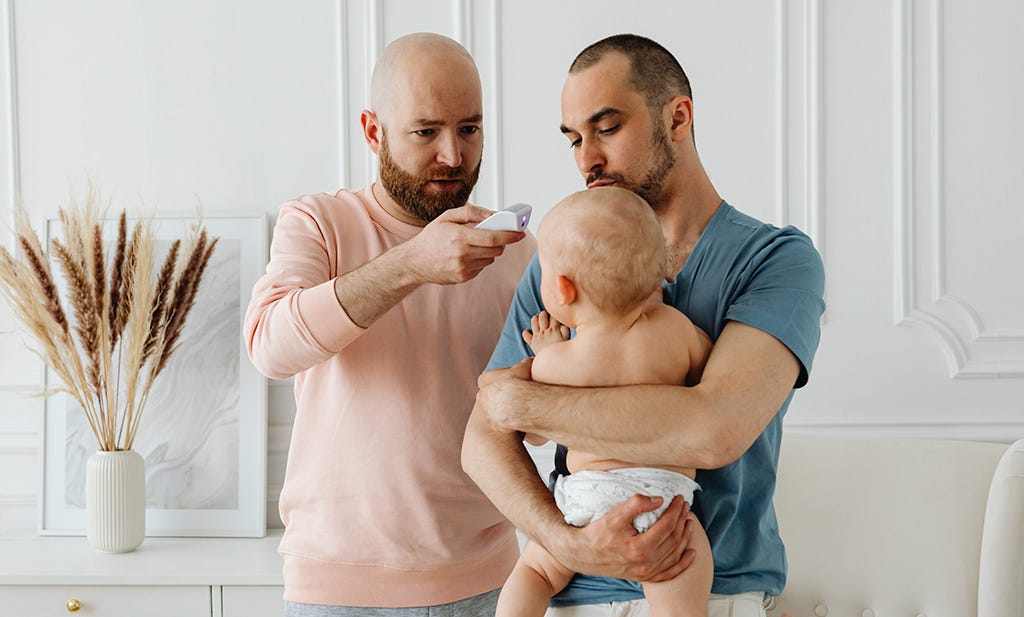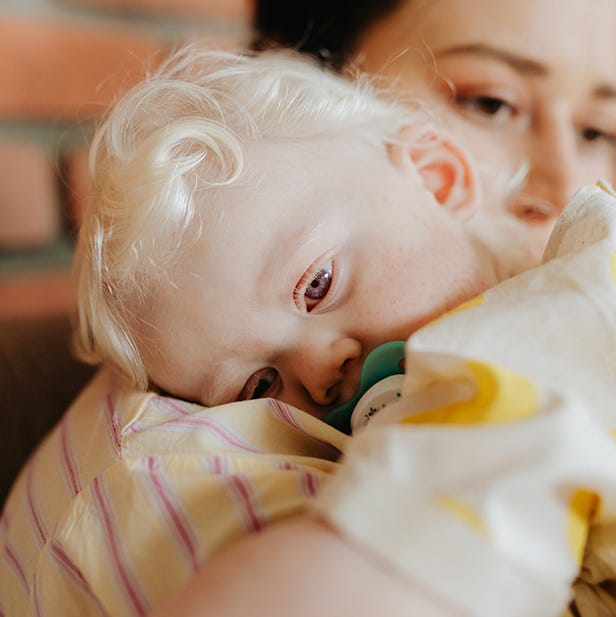
As a parent, it’s heart breaking to see your little one feeling unwell. A baby cold or a baby cough can be a BIG problem for sleep for both baby and you. It's so hard to comfort them while meeting all their other needs whilst trying to help them (and you!) get the rest they need. Sometimes it can be overwhelming.
Our UK sleep specialist Gemma Coe is a mum of two herself and is a certified baby and child sleep consultant. She helps families all over the world develop healthy sleep habits.
Today, Gemma gets you equipped with the knowledge and tools to create a comfortable sleep environment for your sick baby, adjust sleep routines and expectations during illness, and provide nighttime care that promotes rest and recovery.
Understanding the Impact of Illness on Baby Sleep
It’s no surprise that when a baby is sick it can disrupt their sleep. Those little bodies are working overtime to fight off the infection and illness, which can lead to more frequent waking in the night for care needs to be met. They're also likely to have a high temperature or fever which is miserable! Not forgetting the addition of general discomfort with nausea or rashes such as chicken pox.
Addressing the underlying issue is a key step towards achieving consistent night sleep outcomes in the future. Make sure you've discussed their condition with their GP or other suitable professional where relevant, but reassuringly, most general childhood conditions can be managed in the comfort of your home.
Offering extra comfort to your sick baby can not only make them feel better, but a happier baby will sleep and feed better too. Remember, stress and anxiety can make it difficult for a baby to fall asleep when they are ill. Remaining as positive and happy as possible when around your baby (I know this is hard when they're sick!), could help as emotions can transfer.
Baby Coughing at Night and Other Common Illnesses Affecting Baby Sleep
Colds, ear infections, and fevers are common childhood illnesses that can affect your baby’s sleep. These common illnesses can cause discomfort and disrupted sleep, making it challenging for your little one to get the rest they need. And for parents too, sleeping next to a baby coughing at night is bound to make you need an extra cup of coffee in the morning!
Babies are especially prone to more frequent illnesses as their immune systems are underdeveloped. Not to mention the plethora of colds and infections picked up when they start mixing with others at daycare settings.
If you're unsure if your child has just a common cold then calling 111, visiting your pharmacist or GP will help identify the specific illness your baby is experiencing. Once you know the specific illness, you can provide the right kind of comfort and care they need to recover and sleep better.
It's worth saying to trust your parenting gut instinct on this one too! Sometimes we 'just know’ or have a 'niggling feeling' something is not right. Trust your instincts, you'll be picking up on some small cues and can act on them fast.
Is it Normal for Baby to Sleep More During Sickness?
Illness can have two polar effects. It can lead to an increase in your baby’s sleep needs, or conversely a difficulty in maintaining sleep, thus affecting their sleep quality, and hindering their recovery. If your baby’s nap extends beyond the duration of their usual nap, it is appropriate to check on them first, you'll probably be able to check their nappy and take their temperature whilst still sleeping.
If you're worried, wake them and seek medical attention if necessary. Otherwise let them catch up on their rest. You may choose to sit nearby whilst they recover. Making sure your baby is well-fed and most importantly well-hydrated underpins healthy sleep when sick. Breast/chest milk or formula milk can be a source of comfort and nutrition during this time.

Creating a Comfortable Sleep Environment for a little one with a baby cold or baby cough
Creating a comfortable sleep environment for your sick baby involves maintaining optimal temperature and humidity levels, as well as providing soothing sounds and darkness. Monitoring your baby’s room temperature and humidity levels is helpful, especially if they are congested. Some baby monitors will be able to do all this for you!
Camping out
You may also want to be closer to your baby or child when they're unwell. If your little one is under 6 months old, it's likely they'll be sharing a room with you, and you can respond quickly if they're unwell during the night.
If they're older and in their own room, you may want to consider setting up a camp bed in their room for night sleep. This will help keep them in their own familiar sleep environment and you will be able to provide comfort and reassurance. It also means they don't need to change their own bed for another, and that familiarity will help provide comfort.
Soothing sounds
A calming atmosphere can be created by playing soothing music, soothing them with your voice, and maintaining a dark environment. This can help some restless or fussy unwell babies relax a little. For babies who are congested, you may want to try using saline drops, a cool-mist humidifier, or a steamy bathroom. Creating a cool, dark, and tranquil environment aids your little one in getting the rest they need.
Adjusting Sleep Routines and Expectations During Illness
During illness, flexibility with baby’s sleep schedules and prioritising rest and recovery for your baby is crucial. Your baby may require more restful days with shorter wake windows and longer naps, or they may need the same amount of activity as usual as distraction from feeling poorly is always helpful!
Providing comfort measures like suctioning of the nose or using a humidifier may help promote rest for an unwell infant. Following your baby’s cues and adjusting their sleep schedule accordingly supports their healing process and ensures they get the rest they need.
Nighttime Care for a Sick Baby
Nighttime care for a sick baby involves:
- Attending to night waking
- Ensuring adequate nutrition and liquid intake throughout the night
- Making time for extra cuddles and comfort
If your baby is sleeping for an extended period and has been suffering from dehydration, your health professional may suggest it may be necessary to rouse them to drink for nourishment fluid intake. Monitoring the number of wet nappies can also help you identify if your infant may be dehydrated so keep a little diary.
If you're worried this will be problematic for night weaning, for those who have chosen that route, then please don't! As they get better, you'll be able to work on reducing the night feeds again.
Getting Back on Track After a Baby cold or Baby cough
Once your baby has recovered from their baby cold, baby cough or other illness, you can get back on track with their regular sleep routines. Take your time and reach out to a sleep consultant if you need extra support. Your baby is able and capable to return to pre-illness sleep!
It's best to anticipate a period of 2-4 nights before a regular routine is re-established. Maintaining consistency during this period will help. Identifying and addressing any new sleep associations helps your baby maintain healthy sleep habits and ensures a smooth transition back to their regular sleep routines.
Remember, sleep is crucial for your baby’s healing process, and your love and care during this challenging time will make all the difference. Stay strong, and here’s to healthy sleep for your little one.





















